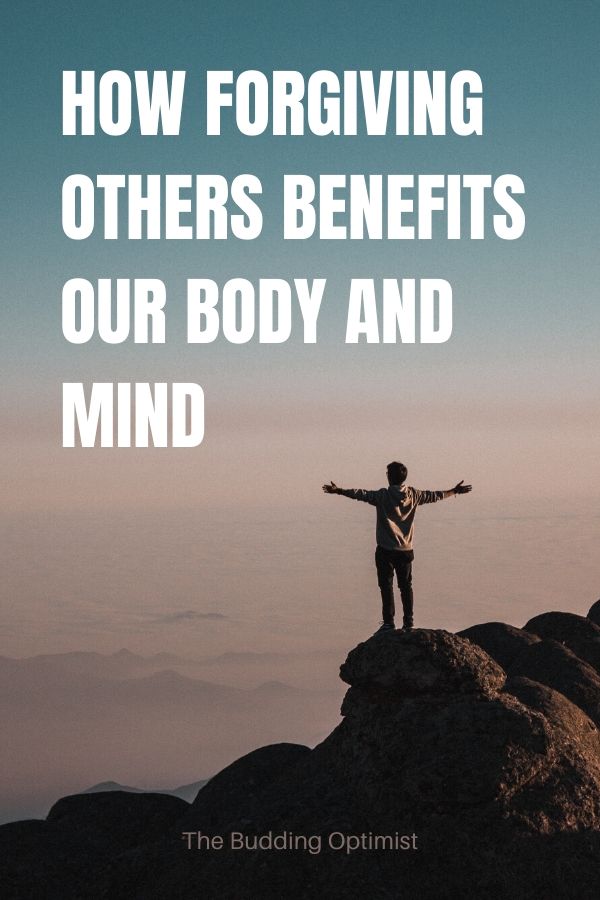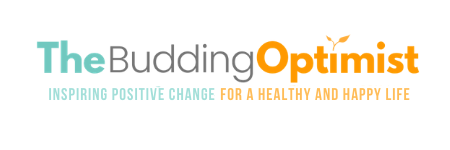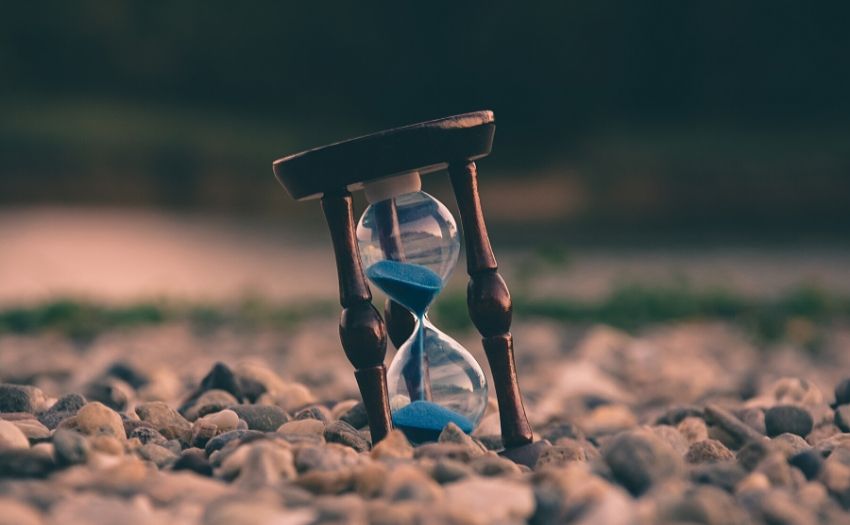Struggling With Forgiveness? 10 Steps That Will Help You Forgive and Move On
I’ll never forget the day when my father asked for my forgiveness.
It was a sunny afternoon. I recall vividly a ray of sunlight streaming through the window, lighting his tall frame. There were tears glistening on his face.
It was the first time we had seen each other after a long period of estrangement, but it wasn’t how I would have wanted this reunion to happen.
I had always imagined if I was going to see my father again, I would show him how strong and successful I had become despite all the pain he had put me through. “See? I’m doing just fine without you.” I would say to him in this imaginary meeting I had pictured in my mind.
But there I was, plopped limply against a pillow in a small hospital bed, with various tubes coming out of my body, my face a bluish pale and my once long, dark hair all but gone. Not exactly the “rub-it-in-your-face” kind of meeting I had hoped it would be.
After a few moments of awkward silence, he approached my bed. His shoulders heaved and his voice shook as he began to tell me he felt responsible for my illness.
“I’m sorry.” He said with his face buried in his hands. “Will you forgive me?”
I was stunned. It’s unheard of for any parent to apologize to their children in Asian cultures, no matter what they’d done. But when the shock wore off, my first thought was: “Why should I?”
My resentment towards my father ran long and deep, like the Yangtze River that flowed through the hometown in my childhood memories.
So many nights, when my mother cried herself to sleep nursing another bruise she got from a fight with my father, I told myself I would never forgive the man who did this to her. So many days, when I needed my father by my side and he was either nowhere to be found or too absorbed in his own world to notice me, I told myself I would never forgive the man who left a big, gaping hole in my heart growing up.
But I did, eventually, forgive my father. I did, eventually, leave my resentment behind. And it was one of the best decisions I made in my life.
Why?
Because as I’ve found out, forgiveness is good for the body and the mind.

Benefits of Forgiveness
I believe, without a doubt, that if I hadn’t forgiven my father, I wouldn’t be feeling as well as I do today. And scientific evidence suggests I’m probably right in my assumption.
Forgiveness, as research shows, can improve our mental health by reducing anxiety and depression.
It also lowers our risks of developing Coronary Heart Disease, which is linked to anger and hostility.
And that’s not all. Researchers say that forgiveness can benefit our physical and mental health in various ways including:
- Lowering chronic stress
- Boosting our self-esteem
- Strengthening our immune system
All these benefits sound great and all, but forgiving someone is not always easy—especially if they hurt us deeply and deliberately.
So how can we forgive someone when it’s hard?
I’m going to share a few insights I gained in the process of learning to forgive and let go.
How to Let Go of Anger and Hurt: 10 Steps to True Forgiveness

1. Know That Forgiveness (Like Happiness) is a Choice
It’s easy to blame others for our unhappiness—especially those who have hurt us. After all, they’re the ones who cut us open, then poured salt all over our wound. And the worst part? They didn’t even apologize! They’re the reason why we’re angry, sad, tormented, untrusting, you name it.
It’s not that we’re unforgiving, it’s that they’re unforgivable.
But is that really true?
Years ago, I stumbled upon this enlightening TED Talk by Buddhist nun Gen Kelsang Nyema about happiness and inner peace. It opened my eyes to who’s ultimately responsible for how we feel—whether good or bad. And it’s not “them”.
We can either choose to continue to hold on to the hurt and let it sour our mood, or we can decide to let it go and make room for more joyful things.
It’s your choice.
2. Recognize the Burden You’re Carrying
A grudge is like a bag of rocks you’re trying to carry with you on a holiday—it serves no purpose other than to weigh you down and make it harder for you to enjoy yourself.
And worse yet, it could make you sick—as I’ve already mentioned earlier. But sadly, many of us don’t feel the full weight of a grudge until our knees buckle under its heaviness.
So now it’s time to take a good look at yourself and ask: How is this grudge I’m holding onto affecting me—my health, my mental wellbeing, and my relationships?
3. Face Your Emotions and Understand the Why Behind Them
One of the greatest gifts we humans have is the ability to look inward.
Why?
Because it allows us to become aware of our thoughts and feelings, and understand what drives our emotions and reactions. And with this awareness and understanding, we gain the power to make positive changes to how we feel and how we respond.
So ask yourself the following questions:
- What’s something that hurt me deeply?
- How do I feel about the experience and the person who hurt me?
- Why do I feel this way? What are the underlying emotions and thoughts behind my feelings?
And don’t stop at the most obvious answer. Dig deeper. Keep exploring the “why” behind your feelings until you get to the real root of your emotions—and you will know in your heart once you discover it.
4. Understand Their Humanness
You know those villains in the old fairy tales that are just one dimensional—they’re pure evil and that’s that?
Once upon a time, I saw my father as someone like that—a one-dimensional villain in the story of my life, the jerk who wrecked my childhood and teenage years and could never do enough to deserve my forgiveness.
But as I matured, I learned to see him more and more as a fully-developed character. I came to understand, and finally even empathize with his humanness—his flaws, insecurities, and all.
Instead of thinking “he’s just born a bad person”, I started to reflect on how his upbringing in an unloving home might have impacted him. Instead of thinking he never truly loved me, I started to realize perhaps he simply doesn’t know how to love. And instead of resenting him for his violent behaviours, I started to feel sorry for him for the fact that he had so much anger poisoning his soul.
And once I started to understand his humanness, I realized—as impossible as it had seemed—I could find the compassion to forgive him.
So as hard as it may be, try to look at the person who hurt you as a real, multi-faceted human being—a fully-developed character with a background story that perhaps may explain why they did what they did. Although it won’t change what happened, at least you might be able to see that they’re not as evil as you might have once believed.
5. Stop Picking at Old Wounds
If you want to let go of the bitterness and heal for good, you got to stop picking at old wounds.
What do I mean by that? I mean stop doing the following:
- Replaying hurtful moments in your mind and reliving the emotions you felt at the time.
- Telling others about hurtful experiences over and over, stirring up negative feelings.
- Reminding yourself that you’re a victim.
I used to do these things all the time, and as a result, I became more and more bitter.
The more pain I felt, the harder it was for me to let things go.
Finally, I realized in order for me to move on and actually enjoy life, I had to stop picking at my old wounds—starting with putting those bad memories to rest and stop telling myself that I’m a victim of terrible fatherhood.
And when I did, the pain subsided until at last, I could let the past go.
So if you have the habit of picking at your old wounds, it’s time to stop and let yourself heal.
6. Strive to Become a Bigger Container
I once read a story, it goes something like this:
A master wanted to teach his apprentice a lesson about peace, compassion, and forgiveness. One day, he asked the apprentice to get a handful of salt, mix it in a cup of water, and then take a sip.
The apprentice grimaced after he tasted the water. “Ah, it’s so salty!”
Next, the master asked the apprentice to put an equal amount of salt in a nearby lake. Once the salt dissolved in the lake, the master told the apprentice to drink from the lake.
“Do you taste the salt this time?” The Master asked the young man.
“No,” the apprentice replied. “I don’t taste the salt at all. The water tastes refreshing.”
“But the amount of salt didn’t change, so how could the water be undrinkable in a cup of water and yet, become refreshing in a lake?” The master asked.
After thinking for a moment, the apprentice said: “Because the size of the container increased.”
“So you see, the problem is not the amount of salt—it’s the container,” the master smiled and said to the apprentice. “It’s the same when we feel we’ve been hurt by the unjust words or actions of others. Instead of blaming the salt for being too salty, we must strive to become a bigger container.”
And how can we become a bigger container? By cultivating a spirit of gratitude, for one, and by training our mind to stop taking things too personally.
7. Remind Yourself What Really Matters
What’s really important to you? Spending your time and energy on the people and things you value in life, or wallowing in negative emotions while nursing a grudge?
Don’t let bitterness and resentment take you away from what really matters. It’s not worth it, especially if the person who hurt you is not someone you care about. And if it is someone you care about deeply, then forgiveness could save you from a lifetime of regret. When Karl Pillemer, a gerontologist from Cornell University, conducted a study that involved asking 1,500 people over the age of 65 about the choices they regret the most in life, he found that one of the biggest regrets people have towards the end of their lives is not reconciling with someone they love.
8. Look at What You’ve Gained From the Experience
When someone hurts you—especially when it’s someone close to you—it’s hard to see the experience as anything but a gut-wrenching blow. It’s normal to only want to focus on your pain and mourn over what you’ve lost.
But let’s not forget the silver lining here—there’s always something to be gained from these negative experiences in life, whether it’s a valuable life lesson (a tough one perhaps, but still valuable), an opportunity for change, or a trigger for us to reflect on our values and goals in life.
For example, rather than resenting my dad for how my childhood and teenage years played out, I now choose to focus on what I’ve gained from the experience. It’s taught me that our words and actions have lasting impact on those who we love and love us. It’s taught me that marriage and parenthood are sacred things that should not be taken lightly. And it’s taught me what to look for in a life partner and how to ask for what I truly deserve in a relationship.
When I think about these lessons I’ve learned, I don’t feel the experience was all negative. In fact, I’ve come to view the experience as a source of strength.
So if you’re having a hard time forgiving someone for hurting you, ask yourself: “Is there anything I’ve gained from this experience?”
9. Let Time Do Its Magic
You’ve heard the saying “time heals all wounds”, right?
It may sound cliché but there is some truth to it. It’s not really the passage of time that helps mend our emotional wounds—the healing powers come from the way our brain works.
First of all, our memories naturally fade over time. You simply won’t remember every hurtful word or action someone has said or done. And even if you do remember, you may not remember the experience exactly how it happened. And that’s because our brains constantly reconstruct how we remember our experiences.
Don’t believe me? Just re-watch some of your old home videos(birthday party from the year 2000 perhaps?). I’m sure you’ll come across a moment where you go: “I don’t remember it like that!”
And the good news is, we don’t always reconstruct our negative memories in a negative way. Time gives us the space we need to let emotions diffuse and see the experience from multiple angles. Time also allows us the opportunity to put things into perspective—what happens at a moment in time may appear large and all-consuming at that moment, but will likely appear small and insignificant when compared to decades of life events.
10. Set Rules of Engagement
One common misconception people have about forgiveness is that if you forgive someone who has hurt you, then you might as well let them walk all over you because they’ll just keep hurting you over and over again.
But hold on, forgiving someone doesn’t mean you have to let them keep hurting you.
You’re not a doormat.
First of all, you can forgive someone and go your separate ways. There’s nothing wrong with keeping your distance from people who bring negative energy into your life.
And if you do decide to keep them close, it’s important to set rules of engagement. What behaviours are not okay? What do you need from them in order to feel emotionally safe around them? And what’s going to happen if they deliberately hurt you or break your trust again? All important things to think about and bring out in the open to discuss.
I’m all for giving people the benefit of the doubt, but I also believe that if someone breaks my trust, the onus is on them to earn it back. And before that trust is rebuilt, you bet I’m going to set some ground rules and I’ll be watching my back.
Where I am in My Journey to Forgiveness Today
It’s been more than a decade now since I’ve learned to forgive my father. I can now talk about him and think about him without feeling waves of emotions, and there are days when I’ll even remember our good times fondly.
But if there’s one surprising thing I learned about forgiveness is that when you forgive someone, it doesn’t mean you have to be in their life. A few years ago, we drifted apart again after a brief period of reconciliation, and we both accepted this as a natural course of things. We’re just very different people in terms of our values, personalities, and outlooks on life. With so little in common, the only bond we really have left—our blood—was simply too weak to keep our relationship afloat. So we both continue with our lives apart from each other, at least for now.
I wish him the best in his life and I hope he does right by his new family. If our paths cross again, perhaps I’ll tell him the answer he was waiting to hear that day when he stood in front of my hospital bed. But I think deep down, he already knows.
Recommended Articles in Personal Growth and Mental Wellbeing:
How to Stop Regretting the Past and Start Enjoying Your Life
Need to Have a Good Cry But Don’t Know How?
Stop Trying to Suppress Negative Emotions. Do These Things Instead







Really enjoyed this article. Thank you for posting!
Hello Mackenzie, thank you for reading and letting me know you enjoyed this article!
Thank you for publishing this article and for sharing your wisdom with readers like me. It was very helpful.
Thank you Dan, glad you found the information helpful!